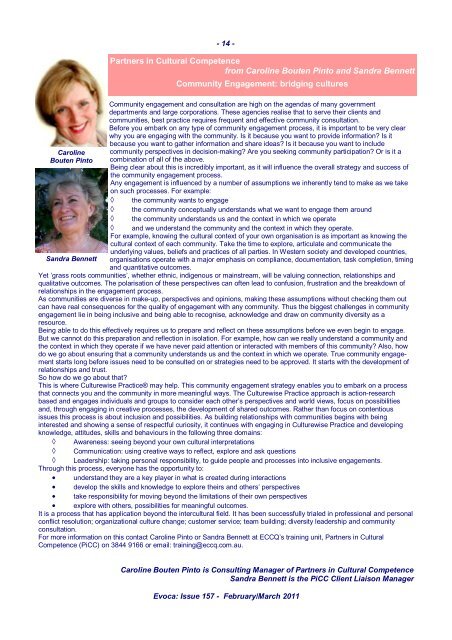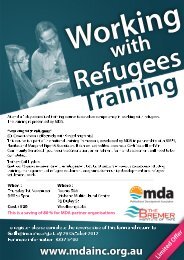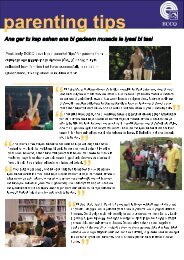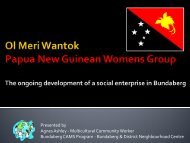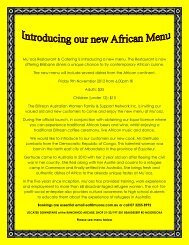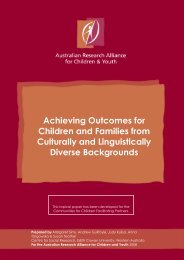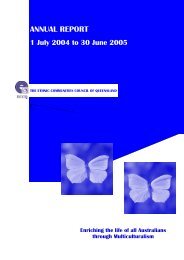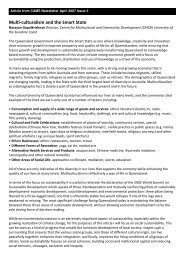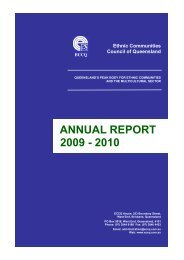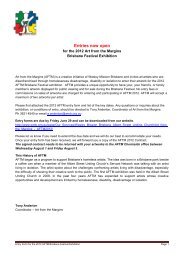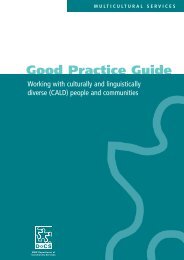EVOCA
EVOCA Issue: 157 February/March 2011 - Ethnic Communities ...
EVOCA Issue: 157 February/March 2011 - Ethnic Communities ...
Create successful ePaper yourself
Turn your PDF publications into a flip-book with our unique Google optimized e-Paper software.
Caroline<br />
Bouten Pinto<br />
Sandra Bennett<br />
- 14 -<br />
Partners in Cultural Competence<br />
from Caroline Bouten Pinto and Sandra Bennett<br />
Community Engagement: bridging cultures<br />
Community engagement and consultation are high on the agendas of many government<br />
departments and large corporations. These agencies realise that to serve their clients and<br />
communities, best practice requires frequent and effective community consultation.<br />
Before you embark on any type of community engagement process, it is important to be very clear<br />
why you are engaging with the community. Is it because you want to provide information? Is it<br />
because you want to gather information and share ideas? Is it because you want to include<br />
community perspectives in decision-making? Are you seeking community participation? Or is it a<br />
combination of all of the above.<br />
Being clear about this is incredibly important, as it will influence the overall strategy and success of<br />
the community engagement process.<br />
Any engagement is influenced by a number of assumptions we inherently tend to make as we take<br />
on such processes. For example:<br />
◊ the community wants to engage<br />
◊ the community conceptually understands what we want to engage them around<br />
◊ the community understands us and the context in which we operate<br />
◊ and we understand the community and the context in which they operate.<br />
For example, knowing the cultural context of your own organisation is as important as knowing the<br />
cultural context of each community. Take the time to explore, articulate and communicate the<br />
underlying values, beliefs and practices of all parties. In Western society and developed countries,<br />
organisations operate with a major emphasis on compliance, documentation, task completion, timing<br />
and quantitative outcomes.<br />
Yet ‘grass roots communities’, whether ethnic, indigenous or mainstream, will be valuing connection, relationships and<br />
qualitative outcomes. The polarisation of these perspectives can often lead to confusion, frustration and the breakdown of<br />
relationships in the engagement process.<br />
As communities are diverse in make-up, perspectives and opinions, making these assumptions without checking them out<br />
can have real consequences for the quality of engagement with any community. Thus the biggest challenges in community<br />
engagement lie in being inclusive and being able to recognise, acknowledge and draw on community diversity as a<br />
resource.<br />
Being able to do this effectively requires us to prepare and reflect on these assumptions before we even begin to engage.<br />
But we cannot do this preparation and reflection in isolation. For example, how can we really understand a community and<br />
the context in which they operate if we have never paid attention or interacted with members of this community? Also, how<br />
do we go about ensuring that a community understands us and the context in which we operate. True community engagement<br />
starts long before issues need to be consulted on or strategies need to be approved. It starts with the development of<br />
relationships and trust.<br />
So how do we go about that?<br />
This is where Culturewise Practice® may help. This community engagement strategy enables you to embark on a process<br />
that connects you and the community in more meaningful ways. The Culturewise Practice approach is action-research<br />
based and engages individuals and groups to consider each other’s perspectives and world views, focus on possibilities<br />
and, through engaging in creative processes, the development of shared outcomes. Rather than focus on contentious<br />
issues this process is about inclusion and possibilities. As building relationships with communities begins with being<br />
interested and showing a sense of respectful curiosity, it continues with engaging in Culturewise Practice and developing<br />
knowledge, attitudes, skills and behaviours in the following three domains:<br />
◊ Awareness: seeing beyond your own cultural interpretations<br />
◊ Communication: using creative ways to reflect, explore and ask questions<br />
◊ Leadership: taking personal responsibility, to guide people and processes into inclusive engagements.<br />
Through this process, everyone has the opportunity to:<br />
• understand they are a key player in what is created during interactions<br />
• develop the skills and knowledge to explore theirs and others’ perspectives<br />
• take responsibility for moving beyond the limitations of their own perspectives<br />
• explore with others, possibilities for meaningful outcomes.<br />
It is a process that has application beyond the intercultural field. It has been successfully trialed in professional and personal<br />
conflict resolution; organizational culture change; customer service; team building; diversity leadership and community<br />
consultation.<br />
For more information on this contact Caroline Pinto or Sandra Bennett at ECCQ’s training unit, Partners in Cultural<br />
Competence (PiCC) on 3844 9166 or email: training@eccq.com.au.<br />
Caroline Bouten Pinto is Consulting Manager of Partners in Cultural Competence<br />
Sandra Bennett is the PiCC Client Liaison Manager<br />
Evoca: Issue 157 - February/March 2011


